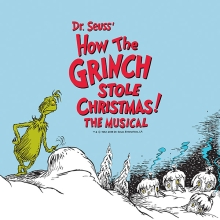Filichia Features: The 25th Year of My Favorite Year

Filichia Features: The 25th Year of My Favorite Year
My Favorite Year recently proved at Feinstein's/54 Below that the musical set in '54 is a marvelous one that deserves your attention.
So why didn't it become a blue-chip title when originally produced twenty-five years ago at Lincoln Center?
That much-too-large, half-circle thrust stage in the Vivian Beaumont Theatre was the main culprit.
Some shows thrive in such a setting. My Favorite Year, however, is a slam-bang, fast-paced traditional musical.
(That's a compliment).
Thus, it really required a frame around it. Without it, the musical looked lost on the vast expanse of the Beaumont.
A fortune was lost, too, as My Favorite Year became one of those shows that played more previews (45) than official performances (36) -- despite a fun-filled and tuneful score from composer Stephen Flaherty and lyricist Lynn Ahrens (in their tune-up for Ragtime).
But if you'd been at Feinstein's/54 Below, you'd have seen how well it played on a conventional stage. My Favorite Year wasn't just a hit, but a surefire, genuine, walkaway, blockbuster, lines-down-to-Broadway, boffola, sensational, box-office, lollapalooza, gargantuan hit.
Most of the jokes either from the screenplay or bookwriter Joseph Dougherty's imagination got laughs. Some even spurred applause - and when that happens, the audience isn't just showing approval and appreciation, but also respect. Good thing the club's manager seemingly kept the temperature at 54 below, for by the time that the show ended, the heat from the applause and cheers made the place feel as if it were 110 in the shade.
As in the 1982 film on which this musical is based, Benjy Stone is a just-starting-out writer on The King Kaiser Comedy Cavalcade. He's always been a rabid fan of derring-do movie star Alan Swann and knows every line of his swashbucklers. (And this was before home video, when you had to wait until a TV station deigned to show what you wanted to see.)
Swann is also a neglectful father whose pre-teen daughter might notice that the two letters that start his first name are the same as Al-Anon's - for Swann has become quite the drunk. King Kaiser sees this and plans to fire him until Benjy begs him to reconsider. King does - on the condition that Benjy keep Swann on the very straight and especially narrow.
King is indeed the king of his castle and makes all his employees fear him. That solves the oft-cited axiom that general audiences don't care about show peoples' problems. Just as A Chorus Line made theatergoers relate to the auditioners -- for all of us have endured grueling job interviews when we've really needed the money -- My Favorite Year has us remember when we've worked for maniacs (and who hasn't?), when we worried that any given moment could be our last.
The film had a subplot of a gangster's enacting revenge on King who'd spoofed him. Dougherty dropped this in favor of giving the show more heart. Because the film established that Benjy's mother was on her second marriage -- but didn't explain what had happened to Husband Number One -- Dougherty had Benjy's dad be one of those men who ostensibly goes out for a pack of cigarettes and never comes home. Swann then became a type of father-figure to Benjy.
Another decision the original production made was bringing Lainie Kazan into the opening number, the sensational "Twenty Million People" that referred to the number of viewers watching the show each week. The fondly regarded Kazan hadn't been on Broadway since Funny Girl, so this would be a triumphant return for the actress who'd reprise the role she'd had in the film: Benjy's mother Belle Mae Steinberg Carrocca.
"Twenty Million People" was going along when Belle suddenly came on, phone in hand, calling Benjy just before air-time. Theatergoers wanted to welcome her with plenty of applause; they were forced to stop mid-clap because Kazan was already talking at full throttle and might have been imparting important exposition.
If your troupe has a beloved and venerable female star who's cast as Belle, keep her off-stage during that phone call and have her speak her lines over the sound system. Bring her on only when the show moves to Brooklyn. Had the Broadway production done this, the disembodied voice would have whetted the audience's appetite for Kazan. Then when she finally arrived, the audience would have smiled, applauded and said "There she is!"
Don't go overboard by making Belle a stereotypical Jewish mother. A woman who was brave enough to marry a Filipino man in the staid, pro forma '50s deserves our respect for her forward-thinking, pioneering values.
He's Rookie Carrocca, who's a stickler in how his surname is pronounced. Rookie wants those two "r's" rolled to the nth degree, so when you audition potential Rookies, give each the "r" test to ensure your choice will be able to realize this requirement.
If your production of The Producers yielded a fine Bialystock and Bloom, consider them for Swann and Stone. Don't fear if your Bialystock was a little (or a lot) on the heavy side and far bigger than Peter O'Toole in the film or Tim Curry in the musical; Swann is said to have gone to seed, so he can have some extra baggage on him. After all, liquor is loaded with calories.
And what a good score! "Shut Up and Dance" actually could have been on what was then called "The Hit Parade" in that soon-to-die pre-rock time. Going back even further, "Professional Show Business Comedy" has a vaudeville feel, which many songs in the TV variety-show era did. It even has a Philadelphia joke when that locale was the go-to place for New Yorkers to mock before they replaced it with New Jersey.
Some teams that have a lousy first quarter wind up winning the Super Bowl (as recently as last January, in fact.) My Favorite Year is ready for its super renaissance under your proscenium arch. Twenty million people deserve to see it.
You may e-mail Peter at pfilichia@aol.com. Check out his weekly column each Monday at www.broadwayselect.com and Tuesday at www.masterworksbroadway.com . His book, The Great Parade: Broadway's Astonishing, Never-To-Be Forgotten 1963-1964 Season is now available at www.amazon.com.

























